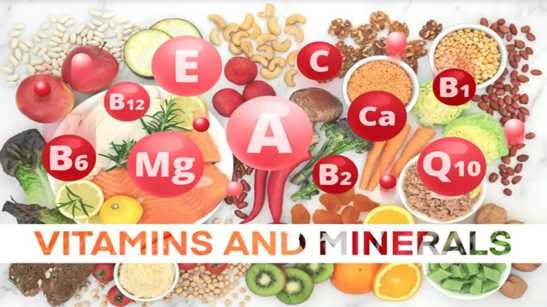Vitamins and minerals are essential nutrients required by the human body for optimal health and function. Vitamins are organic compounds that the body requires in small amounts and play important roles in various bodily processes, including metabolism, immune function, and skin health. On the other hand, minerals are inorganic compounds that are essential for healthy bones, teeth, and muscle function, among other roles in the body.
There are several types of vitamins and minerals, each with their unique functions and food sources. For example, vitamin C is important for immune function and collagen production and is found in foods such as citrus fruits and bell peppers. Calcium is a mineral that is essential for strong bones and teeth and can be found in dairy products and leafy greens.
A balanced and varied diet that includes a range of fruits, vegetables, whole grains, lean proteins, and dairy or dairy alternatives can help ensure that the body receives all the essential vitamins and minerals it needs for optimal health and function. In some cases, dietary supplements may be recommended to fill any gaps in the diet, particularly in individuals with certain health conditions or dietary restrictions.
There are many types of vitamins and minerals that are essential for maintaining good health. Here are some examples of each:
Contents
Vitamins:
- Vitamin A
- Vitamin B1 (thiamine)
- Vitamin B2 (riboflavin)
- Vitamin B3 (niacin)
- Vitamin B5 (pantothenic acid)
- Vitamin B6
- Vitamin B7 (biotin)
- Vitamin B9 (folic acid)
- Vitamin B12
- Vitamin C
- Vitamin D
- Vitamin E
- Vitamin K
Minerals:
- Calcium
- Iron
- Magnesium
- Potassium
- Sodium
- Zinc
- Copper
- Manganese
- Selenium
- Chromium
- Iodine
- Fluoride
- Phosphorus
- Molybdenum
- Chloride
Here’s a brief explanation of each vitamin and mineral:
Vitamins:
- Vitamin A: This fat-soluble vitamin is important for vision, immune function, and healthy skin. It can be found in foods like liver, sweet potatoes, and carrots.
- Vitamin B1 (thiamine): This water-soluble vitamin helps convert food into energy and is important for the nervous system. It can be found in foods like whole grains, pork, and beans.
- Vitamin B2 (riboflavin): This water-soluble vitamin is important for energy production and healthy skin. It can be found in foods like dairy products, leafy greens, and lean meats.
- Vitamin B3 (niacin): This water-soluble vitamin is important for energy production and can help lower cholesterol levels. It can be found in foods like poultry, fish, and whole grains.
- Vitamin B5 (pantothenic acid): This water-soluble vitamin is important for energy production and is involved in the production of hormones and cholesterol. It can be found in foods like chicken, beef, and mushrooms.
- Vitamin B6: This water-soluble vitamin is important for protein metabolism and helps maintain proper brain function. It can be found in foods like bananas, avocados, and chicken.
- Vitamin B7 (biotin): This water-soluble vitamin is important for healthy hair, skin, and nails, as well as carbohydrate metabolism. It can be found in foods like eggs, nuts, and sweet potatoes.
- Vitamin B9 (folic acid): This water-soluble vitamin is important for DNA synthesis and is especially important for pregnant women. It can be found in foods like leafy greens, citrus fruits, and beans.
- Vitamin B12: This water-soluble vitamin is important for nerve function and DNA synthesis. It can be found in foods like meat, fish, and dairy products.
- Vitamin C: This water-soluble vitamin is important for immune function and the production of collagen, a protein that is important for skin health. It can be found in foods like citrus fruits, kiwi, and bell peppers.
- Vitamin D: This fat-soluble vitamin is important for bone health and immune function. It can be found in foods like fatty fish and fortified dairy products, and is also produced by the body when the skin is exposed to sunlight.
- Vitamin E: This fat-soluble vitamin is an antioxidant that helps protect cells from damage. It can be found in foods like nuts, seeds, and leafy greens.
- Vitamin K: This fat-soluble vitamin is important for blood clotting and bone health. It can be found in foods like leafy greens, broccoli, and liver.
Minerals:
- Calcium: This mineral is important for bone and teeth health, as well as muscle function. It can be found in foods like dairy products, leafy greens, and tofu.
- Iron: This mineral is important for oxygen transport and is especially important for women who are pregnant or menstruating. It can be found in foods like red meat, beans, and fortified cereals.
- Magnesium: This mineral is important for muscle and nerve function, as well as bone health. It can be found in foods like nuts, seeds, and leafy greens.
- Potassium: This mineral is important for heart health and can help lower blood pressure. It can be found in foods like bananas, avocados, and potatoes.
- Sodium: This mineral is important for fluid balance and nerve function, but too much sodium can be harmful. It is found in many processed foods and is also added to table salt.
- Zinc: This mineral is important for immune function, wound healing, and the senses of taste and smell. It can be found in foods like oysters, beef, and fortified cereals.
- Copper: This mineral is important for the formation of red blood cells and connective tissue, as well as iron absorption. It can be found in foods like liver, shellfish, and nuts.
- Manganese: This mineral is important for bone health and is involved in the metabolism of carbohydrates, protein, and cholesterol. It can be found in foods like whole grains, nuts, and leafy greens.
- Selenium: This mineral is important for immune function and thyroid health. It can be found in foods like Brazil nuts, tuna, and eggs.
- Chromium: This mineral is important for glucose metabolism and may help improve insulin sensitivity. It can be found in foods like broccoli, whole grains, and lean meats.
- Iodine: This mineral is important for thyroid function and can help prevent goiter. It can be found in foods like iodized salt, seafood, and dairy products.
- Fluoride: This mineral is important for dental health and can help prevent tooth decay. It is often added to drinking water and toothpaste.
- Phosphorus: This mineral is important for bone and teeth health, as well as energy production. It can be found in foods like dairy products, meat, and whole grains.
- Molybdenum: This mineral is important for the metabolism of sulfur-containing amino acids and is involved in the detoxification of certain substances. It can be found in foods like legumes, nuts, and whole grains.
- Chloride: This mineral is important for fluid balance and can be found in table salt and many processed foods.
Conclusion
Vitamins and minerals are essential nutrients that play important roles in maintaining optimal health and function in the human body. They are required in varying amounts and can be obtained from a balanced and varied diet that includes a wide range of fruits, vegetables, whole grains, lean proteins, and dairy or dairy alternatives. While dietary supplements may be necessary in certain cases, it is always best to obtain vitamins and minerals from food sources whenever possible. Understanding the different types of vitamins and minerals and their functions can help individuals make informed choices about their diets and overall health.
10 Proven Ways to Lose Weight Fast Without Exercise
“Types of Vitamins and Minerals with Explanation” Hope this article will be informative for you, please do tell by commenting, any questions and suggestions are welcome. Share, Subscribe to stay connected. Thank you





